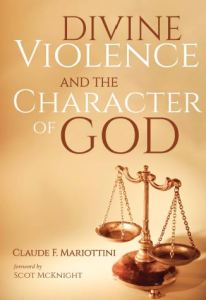Killing the God of Passover

On April 15, 2022, The New York Times published a guest essay titled “In This Time of War, I Propose We Give Up God” written by Shalom Auslander. In his essay Auslander proposes that people should give up on God because of the violence God used in the deliverance of the Israelites from their slavery in Egypt. He even suggested killing the God of Passover.
Mr. Auslander presented only one side of the God of the Hebrew Bible without presenting how the Hebrew Bible emphasizes that the God of Passover is a gracious and merciful God. The purpose of this essay is to present a rebuttal to Mr. Auslander’s view of God.
Reasons for Killing the God of Passover
One reason Auslander struggles with the God of Passover is because of what he learned from his Rabbi when he was eight years old. His Rabbi told him “gruesome tales of torture and persecution.” Here is what the Rabbi taught:
“The Egyptians,” he told us, “used the corpses of Jewish slaves in their buildings.”
“You mean they used slaves to build their buildings,” I asked, “and the slaves died from work?”
“No,” said the rabbi. “They put the Jewish bodies into the walls and used them as bricks.”
Auslander continues teaching what the Rabbi said happened in Egypt:
“God, the rabbi said, struck all the Egyptians with his wrath, not just Pharaoh and his soldiers. Egyptians young and old, innocent and guilty, suffered locusts and frogs, hail and darkness, beasts running wild and water becoming blood. Mothers nursing their babies, the rabbi explained, found their breast milk had turned to blood.”
No wonder Mr. Auslander struggles with the violence of God. Some of the things he learned from his Rabbi never happened. These gruesome stories have the potential to scare, not only children, but even adults.
Auslander also struggles with the God of the Passover story. In his description of God, Auslander emphasizes texts that deal with God’s wrath, his involvement with the slaughter of men, women, and children, and other acts of violence. Mr. Auslander writes about a God who pours out his wrath upon the nations “with plagues and floods, with fire and fury, on the young and old, the guilty and innocent.” He wrote that because Pharaoh refused to allow the people to leave Egypt, “so God, in his mercy, started killing babies.”
When Mr. Auslander asked his Rabbi, “Why did God kill the first-born cattle?” The Rabbi answered, “Because the Egyptians believed they were gods.” Auslander then writes, “Killing gods is an idea I can get behind.”
Mr. Auslander contends that if God “were mortal, the God of Jews, Christians and Muslims would be dragged to The Hague” and be tried for crimes against humanity.
Pharaoh and the Israelites
But what would happen if Pharaoh were to be dragged to The International Criminal Court in The Hague? The International Criminal Court is an international tribunal that has received authority to prosecute individuals for crimes of genocide, crimes against humanity, war crimes and the crime of aggression.
Pharaoh was a cruel master who had no mercy on the demands he imposed upon the Israelites. If Pharaoh came before The International Criminal Court, he would be tried for the violation of human rights by making the people of Israel work as slaves and by oppressing them through forced labor. He would be tried for genocide for killing newborn children. He would be tried for the death of many slaves who died during the many years the Israelites were slaves in Egypt.
Pharaoh could not be brought to The Hague to be tried for crimes against humanity. No human court would bring charges against Pharaoh for his crimes against humanity. The Egyptian God Ra could not punish Pharaoh for his crimes because Pharaoh was “The Son of Ra” or Rameses.
The Israelites were confident that their God was the only one who could bring Pharaoh to court so that criminal charges could be presented against him. The Israelites were also confident that their God was the only one who could deliver them from their oppressive situation and the only one who could fight for them. Israel had no weapons and no army. A group of slaves was no match for the well-equipped and well-trained army of Pharaoh. The people of Israel had to depend on their God to save them from their oppressive situation in Egypt.
Before divine violence was used, God gave Pharaoh an opportunity to avoid violence. God sent Moses and Aaron to Pharaoh with a message, “Let my people go.” If Pharaoh had allowed the people to leave Egypt, there would be no violence. But Pharaoh refused. He said to Moses, “I will not let Israel go.”
God could accept Pharaoh’s decision and let Israel suffer and perish as slaves in Egypt. Or God could act and deliver the people. The decision to deliver Israel would involve violence. Divine violence happened because of human intransigence.
When Pharaoh took his army with him and his hundreds of chariots to pursue the people of Israel to kill them or to bring them back to Egypt, God had only two choices: to do nothing and let the people be killed by Pharaoh and his army or act on behalf of Israel and deliver the people from the threat posed by Pharaoh’s army.
The decision to act and save Israel required violence. Israel could not defend itself; God acted as a warrior to defend Israel.
In order to save his people, God had to use violence. Fighting against the Egyptians was the only way by which the salvation of Israel could be accomplished. God used the forces of nature against the army of Pharaoh. Hundreds of Egyptians had to die in order for God to save the lives of thousands of men, women, and children.
The Problem of Indifference to Evil
When dealing with the problem of divine violence in the Bible, the tendency is to vilify God by emphasizing his wrath and his use of violence. The vilification of God occurs when God is blamed for every act of violence in the Bible. Divine violence occurs in response to human violence.
The reason God sent the flood upon the earth was because God saw that the wickedness of humankind was great in the earth. God also saw that every inclination of the thoughts of humans was only evil continually (Genesis 6:5). In addition, the earth was filled with violence.
When people look at the flood, they fail to see human wickedness, human evil, and human violence. They only see the violence God used to address the problem of evil and violence. Auslander does not see the evil and violence Pharaoh used against the Israelites. He only sees the violence God used to deal with the violence of Pharaoh.
Another way of dealing with the problem of divine violence is by humanizing God. The humanization of God means the creation of a God who acts the way humans act, the creation of a God in the image of humans. People today tolerate violence, evil, and other deeds that hurt people. In most situations, the victims suffer by the hands of criminals but the criminal, the guilty person goes free, but God by no means clears the guilty (Exodus 34:7).
God’s judgment upon people and upon nations came because of evil and violence. God is not indifferent to human violence.
Abraham Heschel, in his book The Prophets, speaks about the evil of indifference. He writes, “There is an evil which most of us condone and are even guilty of: indifference to evil. We remain neutral, impartial, and not easily moved by the wrong done unto other people. Indifference to evil is more insidious than evil itself; it is more universal, more contagious, more dangerous. A silent justification, it makes possible an evil eruption as an exception becoming the rule and being in turn accepted. . . . God is not indifferent to evil.”
There is violence in the Old Testament and lots of it. There is violence by humans and violence by God. We can easily understand human violence because, as the Bible says, every inclination of the thoughts of their hearts is always evil. It is hard to understand divine violence since the Bible affirms that Yahweh is a merciful and gracious God.
My book, Divine Violence and the Character of God deals with the issue of divine violence in light of the nature and character of God as revealed in the Hebrew Bible/Old Testament. The book deals with God’s violent acts in the Old Testament in light of God’s character as a gracious and merciful God. The book also addresses the issue of collective punishment, an issue which Mr. Auslander raises in his essay.
The aim of my book is to have a dialogue with people who struggle with the violence of God. People who struggle with the violent God emphasize texts that deal with God’s wrath, his involvement with the slaughter of men, women, and children, and other acts of violence.
There is another side of the God of Passover which Mr. Auslander does not mention. The God of Passover is “a God merciful and gracious, slow to anger, and abounding in steadfast love and faithfulness, keeping steadfast love for the thousandth generation, forgiving iniquity and transgression and sin” (Exodus 34:6–7). And this gracious and merciful God is a God who by no means clears the guilty; Pharaoh was guilty of crimes against humanity.
Let us not abandon this gracious and merciful God.
Claude Mariottini
Emeritus Professor of Old Testament
Northern Baptist Seminary
NOTE: Did you like this post? Do you think other people would like to read this post? Be sure to share this post on Facebook and share a link on Twitter or Tumblr so that others may enjoy reading it too!
I would love to hear from you! Let me know what you thought of this post by leaving a comment below. Be sure to like my page on Facebook, follow me on Twitter, follow me on Tumblr, Facebook, and subscribe to my blog to receive each post by email.
If you are looking for other series of studies on the Old Testament, visit the Archive section and you will find many studies that deal with a variety of topics.






